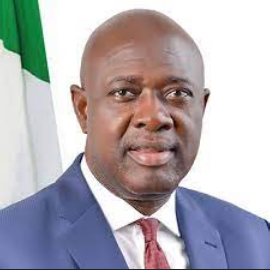
The Minister of State for Petroleum Resources (Oil), Heineken Lokpobiri, has stated that fluctuations in petrol pump prices are primarily driven by the global price of crude oil....CLICK HERE TO READ THE FULL ARTICLE➤
He noted that the downstream sector is now fully deregulated, with the government no longer involved in price-setting.
Lokpobiri made these remarks during the inaugural meeting of the Petroleum Industry Stakeholders Forum held on Thursday in Abuja.
There have been growing concerns over a possible hike in petrol pump prices after Brent crude, the global benchmark, exceeded $80 per barrel.
On Monday, private depots raised the loading cost of petrol and other refined products to N950 per litre.
However, marketers at the meeting assured that an immediate price increase is unlikely.
Speaking to journalists after the meeting, Lokpobiri emphasized that deregulation has eliminated the issues associated with the subsidy regime.
He added that petrol prices are now determined by market forces, with the government focusing on quality control rather than price regulation.
He said, “The whole essence of deregulation is for price to find its level. Before now you will agree with me that every day you are hearing negative news about petrol subsidies. Today, you journalists have no negative news about petrol subsidies because it is completely regulated, and the price will find its level.
READ ALSO: Depots Increase Petrol Price To N950/Litre
“As oil price goes up, petrol price will go up, and as oil price comes down, the price will come up. During the Christmas season, I was in Bayelsa, and I tried to go around different filling stations. Some filling stations were selling N1,020, others were selling N999, while others were selling N1,015.
“What we are concerned about, and I’ve always had that discussion with you, with the Authority Chief Executive of the Nigerian Midstream and Downstream Petroleum Regulatory Authority, is that the government is more interested in quality control. The government is more interested in availability, and what the government is particularly interested in is the dispensation of the right quantity.
“If you are buying 10 litres of PMS, let it be that you are not short-changed by the retail filling station. That is where we have issues. And once there is competition, people have a choice, and that’s why you don’t see any queues”.
The National President of the Independent Petroleum Marketers Association of Nigeria, Abubakar Maigandi, attributed the recent drop in petrol prices to a partnership with the Dangote Refinery.
He explained that members of the association began loading petrol from the Dangote Refinery and the MRS filling station late last year, which has contributed to a reduction in retail petrol prices nationwide.
He said, “We have been loading with the Dangote refinery as same with the MRS. We have an agreement between MRS, Dangote and independent marketers; that is why we sell at a lower price than other marketers because of the partnership with Dangote, and we have a uniform price everywhere in the country; we sell for N935 per litre.”
The Chairman of the Major Energy Marketers Association of Nigeria, Huub Stockman, stated that while crude oil prices influence petrol pump prices, the impact is not always immediate.
He clarified that the recent rise in crude oil prices does not necessarily mean an automatic increase in petrol prices.
Stockman, who also serves as the Managing Director of NNPC Retail, remarked, “I think that is always a bit of a crystal ball conversation if you know what I mean. Because crude and product prices don’t always directly relate.
READ ALSO: Imported Petrol Prices Drop To N900/Litre
“And it’s not always so that when the crude changes, immediately all other products that are derivatives from it change.
“So if I knew, I would probably not be standing here, but I would do something else. But I think normally there is a correlation. But I think it is too early to say when or what impact it would have.”
He acknowledged that crude oil remains a significant component of the pricing template but noted that other market factors also contribute to determining the cost of Premium Motor Spirit (PMS).
Earlier, the Chief Executive of the Nigerian Upstream Petroleum Regulatory Commission (NUPRC), Gbenga Komolafe, highlighted efforts to boost Nigeria’s oil production.
He noted that the number of active oil rigs had risen by 79 percent, from eight in 2021 to the current 38, as part of collaborative efforts with stakeholders.
He said: “The upstream sector experienced growth in the national oil and gas reserves by 1.45 per cent and 0.206 per cent respectively in 2024 compared with 2023 and oil production rose by 26 per cent from April 2023 to November 2024.
“The active rig count increased from an average of 8 in 2021 to 38 as of today representing 79 per cent growth. Also, with effective collaboration with the security agencies, the theft and deferment has reduced drastically by more than 40 per cent in the last year. The import of this is that it is not all gloomy for the industry”. ...CLICK HERE TO READ THE FULL ARTICLE➤
Be the first to comment